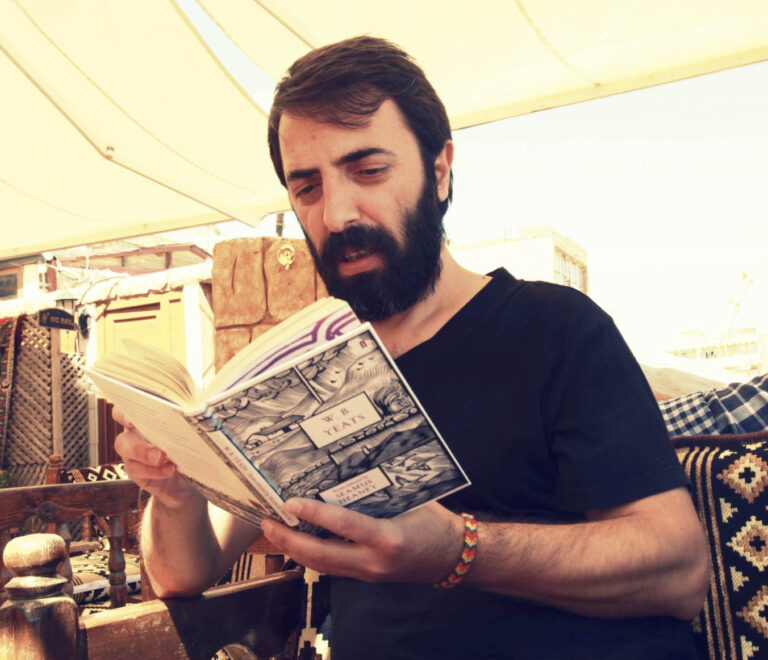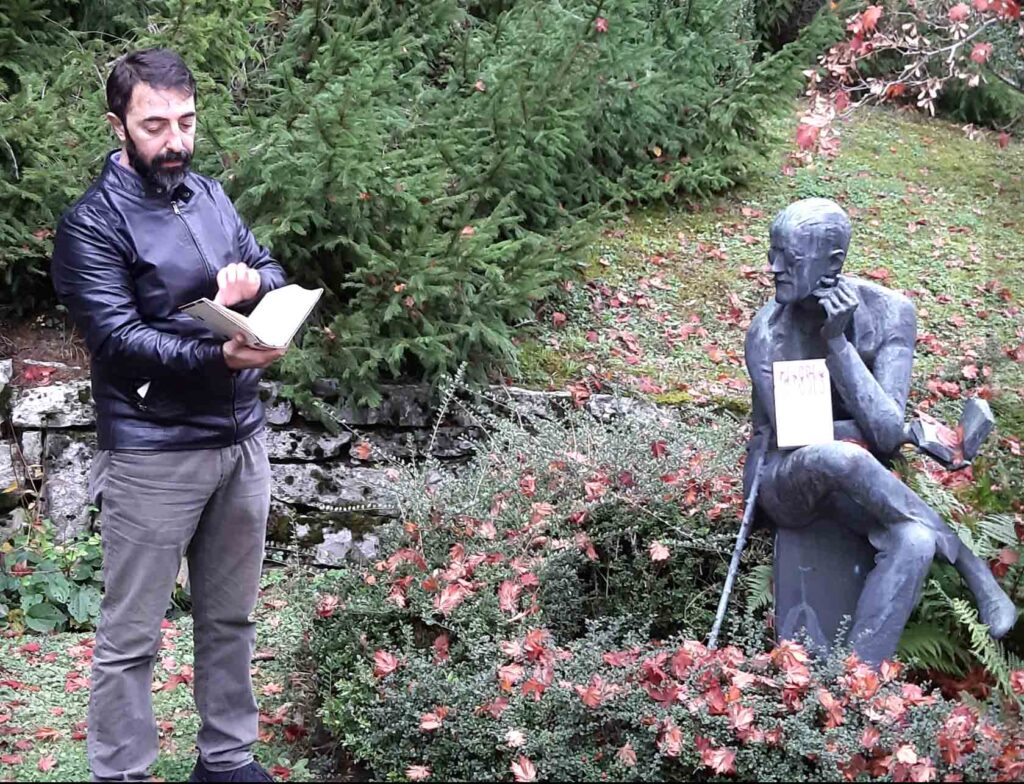Kawa Nemir, Translator and Poet
Kawa Nemir (b. 1974) is best known as a translator of English-language works into Kurmanci. His translations include Ulysses by James Joyce and Hamlet by William Shakespeare. He is also a poet and short story writer, as well as an editor and publisher.

Kawa Nemir was born in 1974 in the eastern province of Iğdır into an upper-class family. When he was a child, his family moved to Istanbul, where his primary education continued. But in school he faced denial of their Kurdish identity: “With the beginning of school,” he later told an interviewer, “. . . they were telling us, ‘You are Kurds, but you are beasts.’ . . . And also, ‘You are not a nation. You are not human. You don’t have any language. You don’t have any literature.’”
He attended the universities of Hacettepe and Istanbul, where he studied English language and literature as well as ancient Greek. But in 2002, Istanbul University expelled him because of his activities involving Kurdish language and literature. At a time when many of his friends were “going to the mountains,” he chose not to join the PKK but instead to become a writer and resolved that his fight would be to keep Kurmanci alive.
Starting in 1997, Nemir was editor-in-chief of Jiyana Rewşen, a prominent cultural and literary magazine in Kurmanci. Under his leadership, the magazine published on monthly basis until 2003, for a total of 52 issues. He also published three issues of the magazine Rewşen-Name. Both magazines were supported by the Mesopotamia Culture Center and represented the views of Generation 90 or Generation Rewşen, to which many influential young poets and writers adhered.
Jiyana Rewşen and Rewşen-Name also published books, including these:
Gilgamêş û Çend Mythosên Din (Gilgamesh and Some Other Myths), mythology. Jiyana Rewşen Editions, 2000.
Mirin Niqutî Dilê Firokevanekî Îrlandî (An Irish Airman Foresees His Death), poetry by William Butler Yeats. Sî Editions, 2002.
Selpakfiroş (The Paper Handkerchief Seller), poetry by Kawa Nemir. Rewşen-Name Editions, 2003.
In 2003, Nemir founded the publishing house Bajar (Town), which aimed to publish Kurmanci translations of world literature, like these:
Pêşengno! Lo Pêşengno! (Pioneers! O Pioneers!), poetry by Walt Whitman. Bajar Editions, 2004.
Welatê Bejî û Deh Koroyên ‘The Rock’ê (The Waste Land and 10 Choruses from ‘The Rock’), poetry by T. S. Eliot. Bajar Editions, 2004.
Ji Çîn û Maçînê + Hemû Berhemên Helbestî yên T. E. Hulme (From China + The Complete Poetical Works of T. E. Hulme), poetry by Ezra Pound and T. E. Hulme. Bajar Editions, 2005.
 But Bajar soon closed for financial reasons.
But Bajar soon closed for financial reasons.
In 2004, Nemir moved to Diyarbakır and tried again: here he founded Lîs Editions, which would publish Kurmanci translations of international classics. This house would enjoy great success, publishing translations of works by William Shakespeare, Franz Kafka, Selma Lagerlöf, Emily Dickinson, William Faulkner, Gabriel García Márquez, Yaşar Kemal, Leylâ Erbil, Orhan Pamuk, and Murathan Mungan. Kawa Nemir translated many of them, including these:
Pûşpera Gêlazan (June of Cherries), poetry by Mehmet Çetin (translated with Lal Laleş). Lîs Editions, 2008.
The Complete Sonnets of William Shakespeare / Hemû Soneyên William Shakespeare, English-Kurdish, poetry. Lîs Editions, 2010.
Diyarbakır Is Waving Its Hands, a city almanac by Şeyhmus Diken. translated from Turkish into English and Kurdish; published as a trilingual edition. Lîs Editions & Sur Municipality of Diyarbakır Editions, 2011.
Taxa Filla (In Our Hometown), a short story by Mıgırdiç Margosyan. Lîs Editions & Sur Municipality of Diyarbakır Editions, 2011.
Beth-Nahrin, by Naûm Faîq, a collection of essays by Naoum Faek, an Assyrian-Syrian intellectual and writer, translated from Assyrian into Kurdish and Turkish; published as a trilingual edition. Lîs Editions & Sur Municipality of Diyarbakir Editions, 2011.
Ev nameya min e ji Cîhanê re (This Is My Letter to the World), poetry by Emily Dickinson. Lîs Editions, 2011.
Hamlet, a play by William Shakespeare. Lîs Editions, 2013.
Xewna Şeveke Havînê (A Midsummer Night’s Dream), a play by William Shakespeare. Lîs Editions, 2013.
Piling (The Tyger), poetry by William Blake. Lîs Editions, 2013.
Siwarên Reş Ji Pişta Behran Hatin (Black Riders Came From the Sea), poetry by Stephen Crane. Lîs Editions, 2014
Bartlebyê Nivîsevan (Bartleby, the Scrivener), a novella by Herman Melville. Lîs Editions, 2014.
Stranên Evînî (Love Songs), poetry by Sara Teasdale. Lîs Editions, 2015.
In 2010 Nemir received the Feqî Huseyîn Sagniç award by the Kurdish Institute of Istanbul.
In 2012 Nemir’s translation of Shakespeare’s Hamlet was produced at the RAST Theater of Amsterdam. It was the first Kurdish adaption of Hamlet and was also staged by the City Theater of Diyarbakir in 2012 and 2013. The troupe toured in Kurdistan, Turkey, and Europe, performing the play more than 120 times.
 Nemir continued to participate in the Kurdish theater scene. Becoming a playwright, he wrote a theatrical adaptation of the 17th-century Kurdish classic Mem û Zîn, by Ehmedê Xhanî. His adaptation was performed by the City Theater of Diyarbakır in 2014. “We have waited so long for such a theater in our own language,” one audience member said. “It’s an historical and beautiful moment for us. We can now see and hear our literature, which has been denied for so long.”
Nemir continued to participate in the Kurdish theater scene. Becoming a playwright, he wrote a theatrical adaptation of the 17th-century Kurdish classic Mem û Zîn, by Ehmedê Xhanî. His adaptation was performed by the City Theater of Diyarbakır in 2014. “We have waited so long for such a theater in our own language,” one audience member said. “It’s an historical and beautiful moment for us. We can now see and hear our literature, which has been denied for so long.”
Meanwhile Lîs Editions continued to publish Nemir’s original writing such as:
Çavdêriyên Barbarekî (Observations of a Barbarian), short stories by Kawa Nemir. Lîs Editions, 2011.
Bîşenga Deşta Dûr (The Drooping Willow of a Distant Prairie), poetry by Kawa Nemir. Lîs Editions, 2006.
Salname (The Yearbook), poetry by Kawa Nemir. Lîs Editions, 2009.
Bêdengî û Tiştên Din (Silence and Other Things), poetry by Kawa Nemir. Lîs Editions, 2012.
Kevirên Bendewarîyê (The Stones of Biding), poetry by Kawa Nemir. Lîs Editions, 2015.
It was a heady time for Kurmanci literature and publishing. Along with Avesta, which mostly published original Kurmanci books, and Aram, which concentrated on works by Kurdish political prisoners and PKK fighters, Lîs helped make the Kurmanci book market thrive, not only in the southeast but in Turkey’s west as well.
Other houses published Nemir’s translations as well:
Erdên Bihuştê yên Winda (The Lost Lands of Paradise), a novel by Yavuz Ekinci, translated from Turkish. Doğan Kitap Editions, 2013.
Tramwaya Viyanê (A Streetcar Named Desire), a play by Tennessee Williams. City Theatre of Diyarbakır Editions, 2013.
Şêweyên Dîtinê (The Ways of Seeing), art criticism by John Berger. Cinema Academy of the Middle East Editions, 2015.
Pen Li Seyrangehê (Pen in the Park), a children’s book by Raşel Meseri. Habitus Kitap Editions, 2015.
In late 2015, Kurdish publishing came to a halt, as the Turkish army attacked several cities in the southeast, killing civilians and committing atrocities. The war continued until the spring of 2016. Turkish armed forces destroyed most of the Sur neighborhood of Diyarbakir, the city’s historical heart. Then after the failed coup attempt of July 2016, anyone suspected of having ties to the plotters or to the PKK was arrested or lost their job. Simply possessing Kurdish books at home could endanger a person’s freedom.
Lîs Editions was not raided, nor its inventory confiscated, but still Nemir looked online for safety. In 2016 he helped found KurdîLit, a website that aims to catalog and digitally archive basic information about Kurdish literature and publishing, especially about writers, translators, publishers, and literary periodicals. By making this basic information accessible in three languages, it would improve the visibility of contemporary literature in the Kurmanjî and Kurmanjkî to the international literary arena. KurdîLit was founded as a collaboration among Diyarbakır Arts Center, Lîs Editions, and Literature Across Frontiers.
Then in October 2017, the arrest of Turkish businessman, social activist, and philanthropist Osman Kavala was arrested. Kavala had been key to the funding provided by European NGOs for publishing and translation projects; his arrest brought them to an end.
Nemir moved to Mardin to try to continue his projects, but he could not find work. When police raided the apartment above his, he realized he had to leave his homeland: “I do not want to end up in jail. Nobody wants that, but I cannot do my work in prison. Like I said, I am disciplined. I have to work. I have to contribute.” Leaving his personal library behind, he traveled to Istanbul, where the Dutch consulate gave him a tourist visa.
The Dutch Foundation for Literature in cooperation with Anne Frank Foundation offered him refuge, and starting in June 2018 he resided in the Amsterdam Vluchtstad apartment in Anne Frank’s former home.
Living in Amsterdam, he continued to initiate projects. He and some Kurdish friends started a new foundation, named after the 17th-century Kurdish poet Ehmedê Xani. He translated Giacomo Puccini’s opera Tosca in to Kurmanci, which was staged in the fall of 2019 at the Amsterdam City Theater.
Kawa Nemir has translated into Kurmanci the works of many British, American, Irish, Canadian, and Turkish poets, novelists, storytellers, and dramatists, including more than 7,000 English-language poems. He has also translated many Greek and Roman literary classics . As of 2018 he had translated over 100 books, of which 28 were published, among them several works of Shakespeare.
He has said that he translates, at least in part, for the benefit of Kurdish writers: “I give writers words. By translating, I expand the Kurdish syntax. Many structures and words I use are put to paper in Kurdish for the first time. This is important in preserving the language. Of course, we need proper education in Kurdish in schools in Turkey, but we cannot wait for that. I have a responsibility. . . . Joyce and Shakespeare are not easy to translate but I do it also because I want to use the full potential of my mother tongue.’”
Continuing his prolific career translation, Nemir has recently completed the translation of Ulysses by James Joyce into Kurdish.
A film about his work was released in 2023. Titled Translating Ulysses, it was written and directed by Aylin Kuryel and Firat Yücel. Watch the trailer.

Sources:
Murat Bayram, “Kawa Nemir: Theatrical Adaptation of Tosca Opera to be Staged in Kurdish,” Bianet, July 10, 2019.
Frederike Geerdink , “Kurdish Translator Kawa Nemir Vows to Keep Kurdish Publishing Going from Amsterdam,” AhvalNews.com, July 6, 2018,
Dorian Jones, “Kurdish Poet Battles to Defend Language, Culture,” VOA, January 30, 2015,
Pieter Verstraete, “‘Acting’ under Turkey’s State of Emergency,” University of Groningen
For further reading:
Kaya Genç, “The Kurdish Ulysses: Kawa Nemir’s Translation Is an Archive of the Language, Which Has Been Suppressed by Turkey’s Nationalist Politics,” Dial, November 28, 2023.















